
contracts
📜 Smart contracts for the Axone protocol (powered by CosmWasm)
Stars: 122
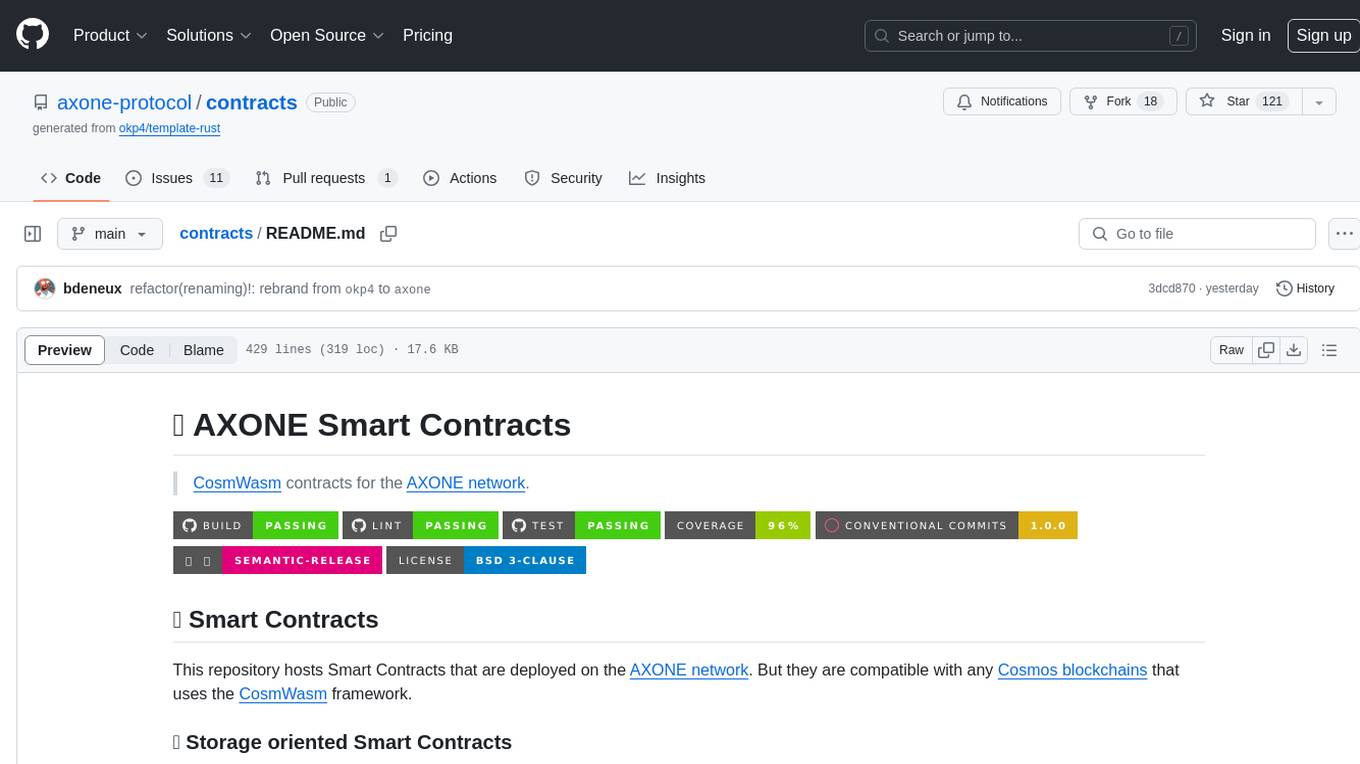
AXONE Smart Contracts repository hosts Smart Contracts for the AXONE network, compatible with any Cosmos blockchains using the CosmWasm framework. It includes storage, sovereignty, and resource management oriented Smart Contracts. Each contract has different functionalities and maturity stages, with detailed tech documentation and emojis indicating maturity levels. The repository provides tools for building, testing, deploying, and interacting with Smart Contracts, along with guidelines for contributing and community engagement.
README:
CosmWasm contracts for the AXONE network.
This repository hosts Smart Contracts that are deployed on the AXONE network. But they are compatible with any Cosmos blockchains that uses the CosmWasm framework.
The class of Smart Contracts which act as reliable repositories, offering secure, efficient, and auditable storage and retrieval of various data types on the blockchain.

→ Tech documentation |
|---|



|
|
A Smart Contract which enables the storage of arbitrary unstructured Objects in any Cosmos blockchains. It provides a flexible solution for storing data without imposing strict schemas or predefined structures, accommodating various data formats and types. |



|

→ Tech documentation |
|---|



|
|
A Smart Contract which facilitates the storage and querying of semantic data using RDF (Resource Description Framework), which represents information as semantic triples. In essence, it serves as a repository for knowledge, providing a dedicated space for storing and retrieving semantic information within any Cosmos blockchains. |



|
The class of Smart Contracts designed to prioritize the sovereignty of the involved parties by allowing them to define and enforce their own rules and regulations.

→ Tech documentation |
|---|



|
|
A multifaceted Smart Contract designed to express and evaluate legal content, including but not limited to regulations, agreements, consents and permissions. It offers extraordinary adaptability and can be utilized in any blockchain within the Cosmos ecosystem that seeks to establish robust and flexible on-chain governance systems. |



|
The class of Smart Contracts designed to manage and orchestrate the lifecycle of various resources in the Dataverse.

→ Tech documentation |
|---|



|
|
A Smart Contract responsible for overseeing and managing the Dataverse within the AXONE network. The Dataverse is an ever-expanding universe that encompasses a wide range of Digital Resources, including datasets, data processing algorithms, ML algorithm, storage resources, computational resources, identity management solutions, orchestration engines, oracles, and many other resources recorded on the blockchain. |


|
The maturity of each contract is indicated by the following emojis.
This stage represents the initial spark or idea that leads to the development of the Smart Contract.
The Smart Contract is still in its infancy, with basic functionalities just being implemented. It is still under development, and its evolution may lead to breaking changes. It is not recommended for production use.
The Smart Contract has undergone a number of tests and improvements, and presents a coherent functional package, but may still lack some advanced features or optimizations. It can be used in production in testnets.
The Smart Contract is fully developed and tested. It's considered safe for production use, offering robust features and optimized performance.
The project is structured around a set of Rust workspaces, each defining a Smart Contract.
.
├── contracts
│ └── <contract>
│ ├── Cargo.toml
│ ├── examples
│ ├── schema
│ └── src
├── packages
│ └── <package>
│ ├── Cargo.toml
│ ├── examples
│ └── src
└─── Cargo.toml
Be sure you have the following tools installed:
- Rust v1.81 or higher
- cargo-make v0.36.3 or higher
- Docker
- jq v1.6 or higher
- npx v8.19.2 or higher
And the following common GNU Core utilities:
To compile the Smart Contracts to Wasm, just invoke the wasm goal of the makefile:
cargo make wasmThis will install the rust Wasm toolchain, if not already done, and start the process for compiling the Smart Contracts to Wasm.
The Smart Contracts are under unit testing. The tests can be launched with the following invocation:
cargo make test-coverageThe project comes with a set of convenient tasks to manage the Smart Contracts and the blockchain. To see the list of available tasks, run the following command:
cargo make --list-all-steps | grep chain | sort | sed -r 's/chain(-?[a-zA-Z\-]*)/- `chain\1`/'The list of available tasks for managing the chain is as follows:
-
chain- Run the axoned CLI using the chain's home directory under a Docker container. -
chain-add-keys- Add a set of predefined keys (recovered from the seed phrases) to the chain. -
chain-clean- Clean the chain data (⚠️ definitively) -
chain-deploy-contract- Deploy a specific contract to the chain. The contract must be compiled and the wasm file must be present in the artifacts directory (under target/wasm32-unknown-unknown/...). -
chain-deploy-contracts- Deploy all the available contracts to the chain (under target/wasm32-unknown-unknown/...). -
chain-execute-contract- Execute a command on a specific contract to the chain. The contract must be already deployed and instantiated. -
chain-init-folder- Initialize deploy folder to make sure scripts have the right permission (needed for linux) -
chain-initialize- Initialize the chain with a validator's key and a set of predefined keys.⚠️ The home directory is cleaned before. -
chain-inspect-contract- Inspect a specific contract deployed to the chain. -
chain-instantiate-contract- Instantiate a specific contract to the chain. The contract must be already deployed. -
chain-list-contracts- List all the contracts deployed to the chain. -
chain-logs- Show the chain's container logs. -
chain-query-contract- Query a specific contract to the chain. The contract must be already deployed and instantiated. -
chain-start- Run the full node axoned application using the chain's home directory under a Docker container. -
chain-stop- Stop the chain's container.
To initialize the chain, just run:
cargo make chain-initializeThis will initialize the chain's home directory and create a validator's key and a set of predefined keys (recovered from the seed phrases).
To start the chain, just run:
cargo make chain-startThis will start the chain's container and run the full node wasmd application.
You can check the chain's logs with:
cargo make chain-logsTo deploy the Smart Contracts, just run:
cargo make chain-deploy-contractsThis will deploy all the available contracts to the chain. For this, the contracts must be compiled and the wasm files must be present in the artifacts directory. See the Build section for more details.
Now, you can interact with the deployed Smart Contracts and test them out.
You can freely interact with the local chain by executing the following CLI command. This will execute the axoned
binary
inside a Docker container with the --home argument pointing to the chain's home directory and using the same network
as
the chain's container. The arguments passed to the command will be directly passed to the axoned binary.
cargo make chain <command>For example, to check the status of the chain, just run:
cargo make chain statusTo stop the chain, just run:
cargo make chain-stopTo clean the chain, just run:
cargo make chain-cleanThe documentation of the Smart Contracts must be committed to the repository. The documentation is generated from the Smart Contracts' schema.
To generate the documentation follow the steps below.
Be sure you have the following tools installed:
- Yarn v1.22.10 or higher
Then, install the dependencies:
yarn global add @adobe/[email protected]To generate the documentation, just run:
cargo make schema
cargo make docs-generateYou'll find the generated documentation under the docs folder.
When developing a new contract, you should commit the generated documentation to the repository. For this, generate the documentation and commit the changes:
git commit -am "docs: update generated documentation"⛓ - The enforcement of stringent rules, monitored by a linter (Clippy) within the Github CI environment.
🤖 - A high level of code coverage through systematic unit testing.
💫 - Future considerations for additional testing approaches, such as fuzzy testing or end-to-end testing, to further enhance quality.
| Date | Auditor | Version | Report |
|---|---|---|---|
| 2024/08/08 | BlockApex | 0cae9ec (v6.0.0) | Axone Smart Contract Audit Report.pdf |
So you want to contribute? Great! ❤️ We appreciate any help you're willing to give. Don't hesitate to open issues and/or submit pull requests.
We believe that collaboration is key to the success of the AXONE project. Join our Community discussions on the Community Repository to:
- Engage in conversations with peers and experts.
- Share your insights and experiences with AXONE.
- Learn from others and expand your knowledge of the protocol.
The Community Repository serves as a hub for discussions, questions, and knowledge-sharing related to AXONE. We encourage you to actively participate and contribute to the growth of our community.
Please check out AXONE health files:
For Tasks:
Click tags to check more tools for each tasksFor Jobs:
Alternative AI tools for contracts
Similar Open Source Tools

contracts
AXONE Smart Contracts repository hosts Smart Contracts for the AXONE network, compatible with any Cosmos blockchains using the CosmWasm framework. It includes storage, sovereignty, and resource management oriented Smart Contracts. Each contract has different functionalities and maturity stages, with detailed tech documentation and emojis indicating maturity levels. The repository provides tools for building, testing, deploying, and interacting with Smart Contracts, along with guidelines for contributing and community engagement.

agentok
Agentok Studio is a tool built upon AG2, a powerful agent framework from Microsoft, offering intuitive visual tools to streamline the creation and management of complex agent-based workflows. It simplifies the process for creators and developers by generating native Python code with minimal dependencies, enabling users to create self-contained code that can be executed anywhere. The tool is currently under development and not recommended for production use, but contributions are welcome from the community to enhance its capabilities and functionalities.

OpenAdapt
OpenAdapt is an open-source software adapter between Large Multimodal Models (LMMs) and traditional desktop and web Graphical User Interfaces (GUIs). It aims to automate repetitive GUI workflows by leveraging the power of LMMs. OpenAdapt records user input and screenshots, converts them into tokenized format, and generates synthetic input via transformer model completions. It also analyzes recordings to generate task trees and replay synthetic input to complete tasks. OpenAdapt is model agnostic and generates prompts automatically by learning from human demonstration, ensuring that agents are grounded in existing processes and mitigating hallucinations. It works with all types of desktop GUIs, including virtualized and web, and is open source under the MIT license.

labelbox-python
Labelbox is a data-centric AI platform for enterprises to develop, optimize, and use AI to solve problems and power new products and services. Enterprises use Labelbox to curate data, generate high-quality human feedback data for computer vision and LLMs, evaluate model performance, and automate tasks by combining AI and human-centric workflows. The academic & research community uses Labelbox for cutting-edge AI research.
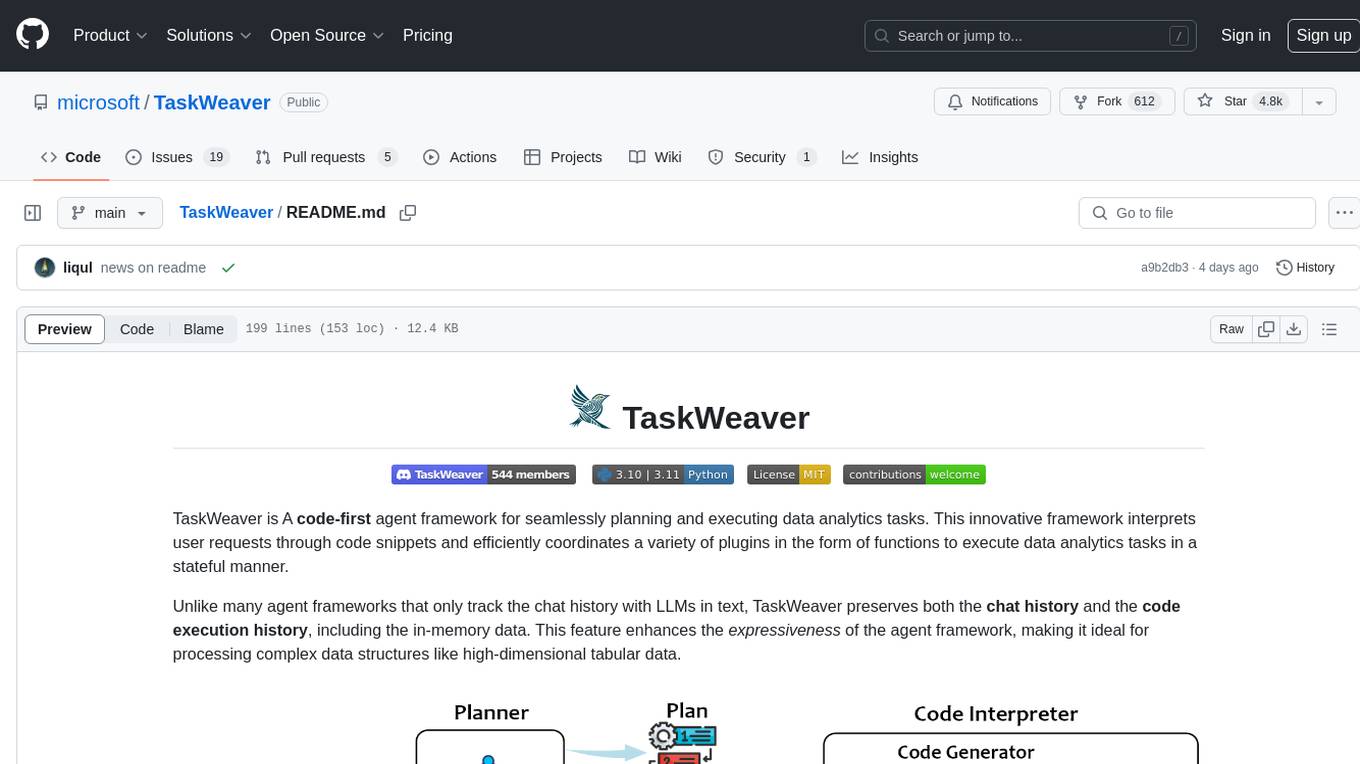
TaskWeaver
TaskWeaver is a code-first agent framework designed for planning and executing data analytics tasks. It interprets user requests through code snippets, coordinates various plugins to execute tasks in a stateful manner, and preserves both chat history and code execution history. It supports rich data structures, customized algorithms, domain-specific knowledge incorporation, stateful execution, code verification, easy debugging, security considerations, and easy extension. TaskWeaver is easy to use with CLI and WebUI support, and it can be integrated as a library. It offers detailed documentation, demo examples, and citation guidelines.
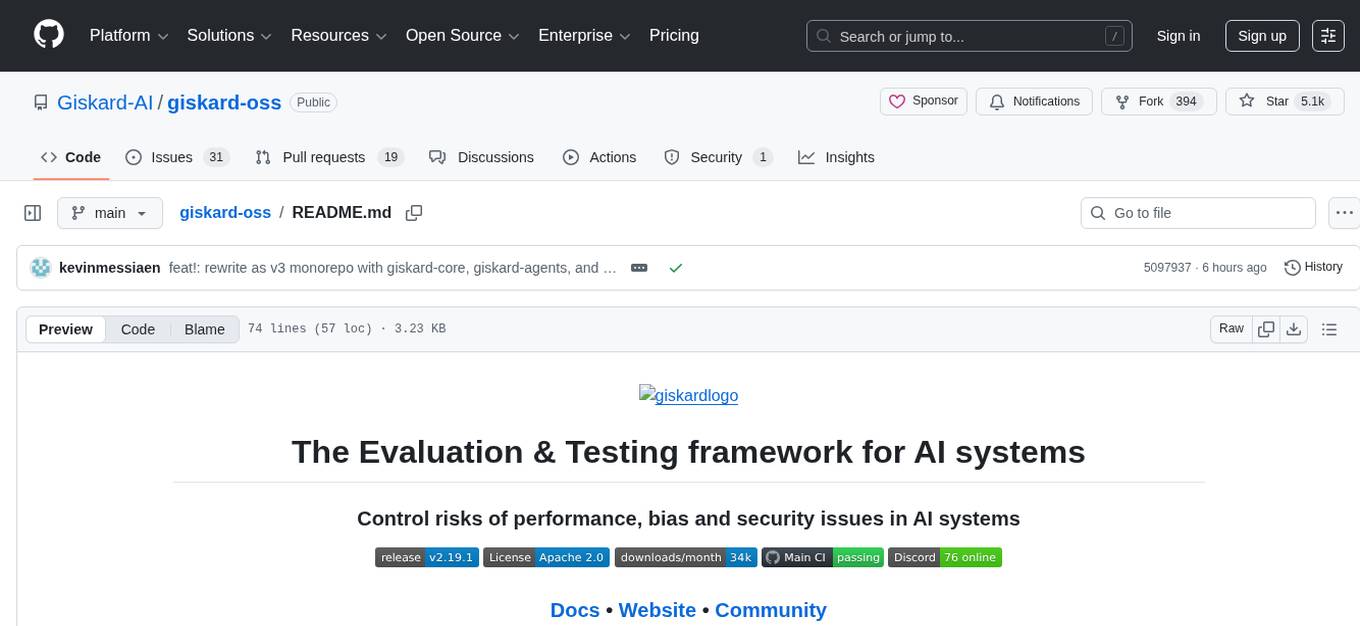
giskard-oss
Giskard-oss is an Evaluation & Testing framework for AI systems that aims to control risks of performance, bias, and security issues. It focuses on LLM systems, with plans for a new scan and a rewrite of RAGET for version 3. The repository is structured as a Python workspace with three packages: giskard-core, giskard-checks, and giskard-agents. Developers can use the Makefile for common tasks, and contributions from the AI community are welcome. The project encourages stars for visibility and offers sponsorship options for support.

DemoGPT
DemoGPT is an all-in-one agent library that provides tools, prompts, frameworks, and LLM models for streamlined agent development. It leverages GPT-3.5-turbo to generate LangChain code, creating interactive Streamlit applications. The tool is designed for creating intelligent, interactive, and inclusive solutions in LLM-based application development. It offers model flexibility, iterative development, and a commitment to user engagement. Future enhancements include integrating Gorilla for autonomous API usage and adding a publicly available database for refining the generation process.
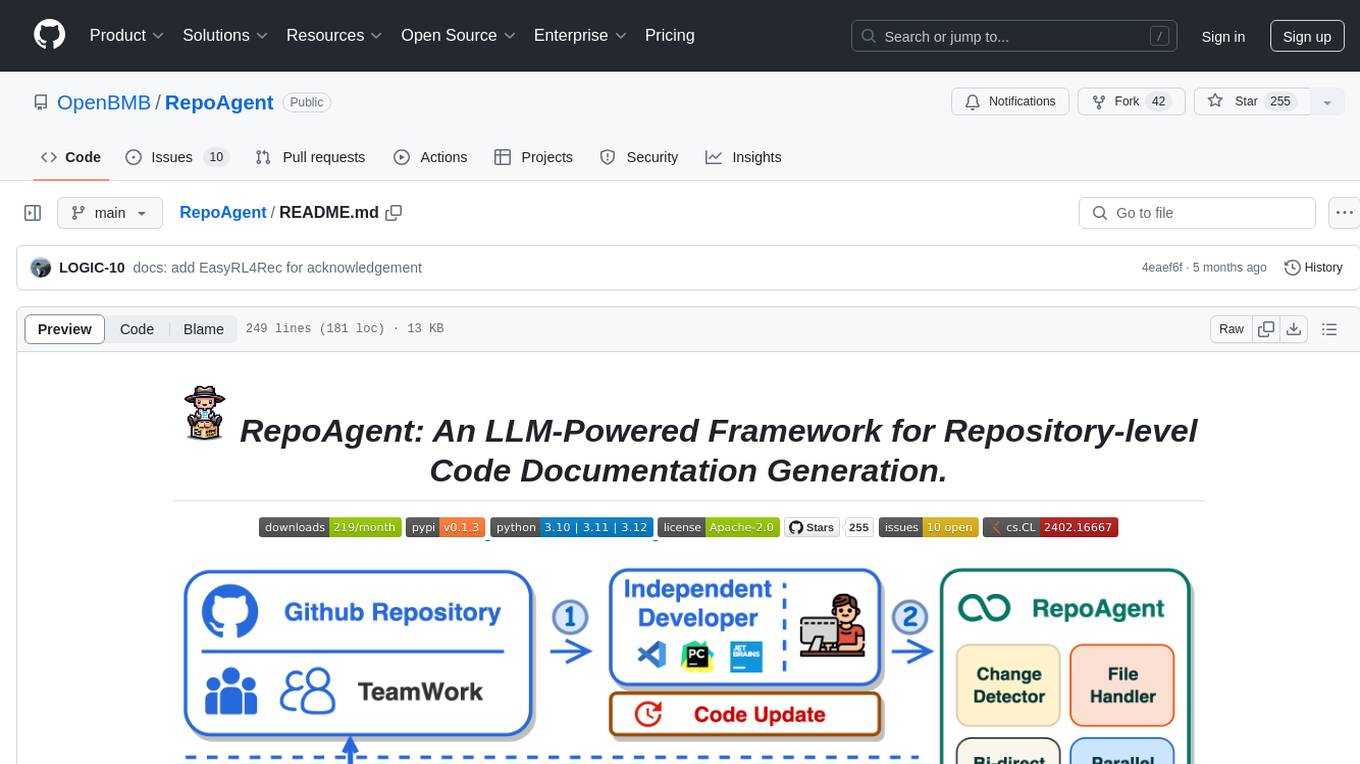
RepoAgent
RepoAgent is an LLM-powered framework designed for repository-level code documentation generation. It automates the process of detecting changes in Git repositories, analyzing code structure through AST, identifying inter-object relationships, replacing Markdown content, and executing multi-threaded operations. The tool aims to assist developers in understanding and maintaining codebases by providing comprehensive documentation, ultimately improving efficiency and saving time.

uAgents
uAgents is a Python library developed by Fetch.ai that allows for the creation of autonomous AI agents. These agents can perform various tasks on a schedule or take action on various events. uAgents are easy to create and manage, and they are connected to a fast-growing network of other uAgents. They are also secure, with cryptographically secured messages and wallets.
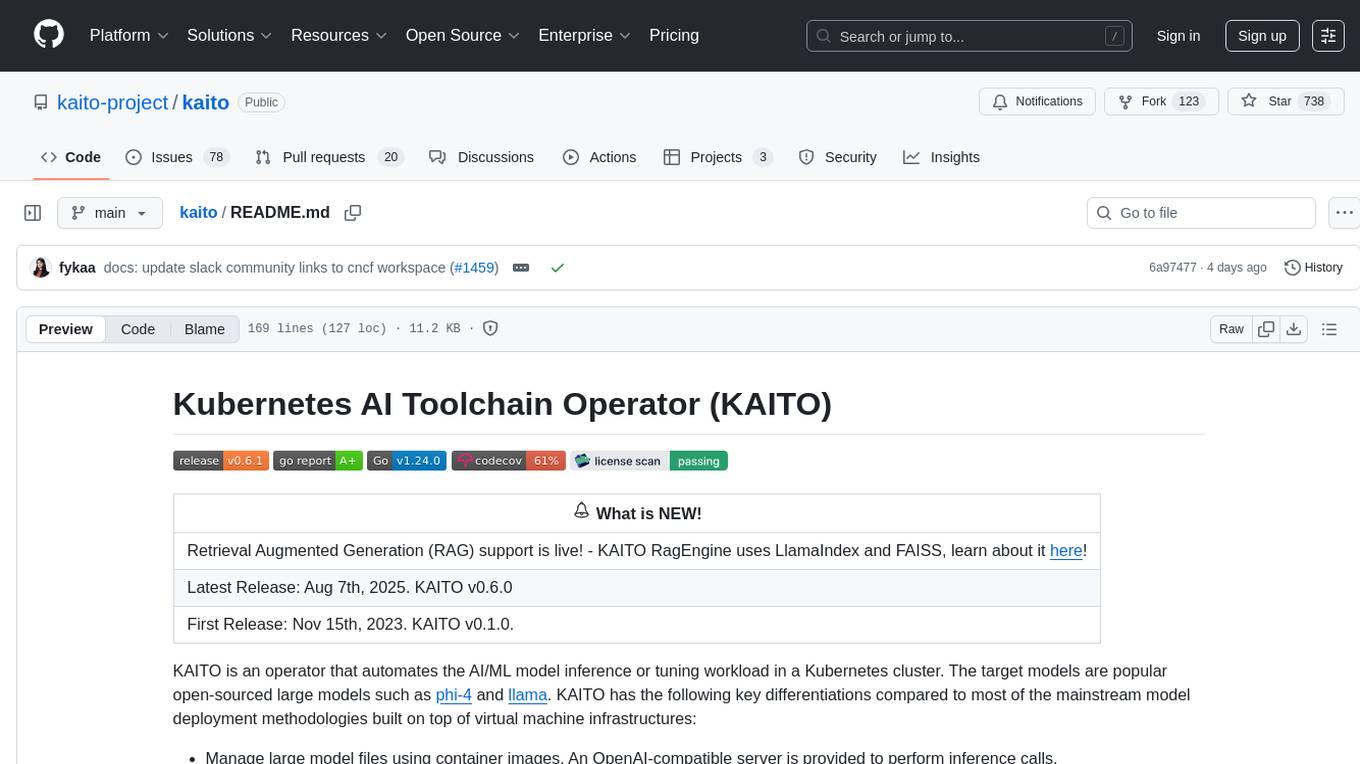
kaito
KAITO is an operator that automates the AI/ML model inference or tuning workload in a Kubernetes cluster. It manages large model files using container images, provides preset configurations to avoid adjusting workload parameters based on GPU hardware, supports popular open-sourced inference runtimes, auto-provisions GPU nodes based on model requirements, and hosts large model images in the public Microsoft Container Registry. Using KAITO simplifies the workflow of onboarding large AI inference models in Kubernetes.
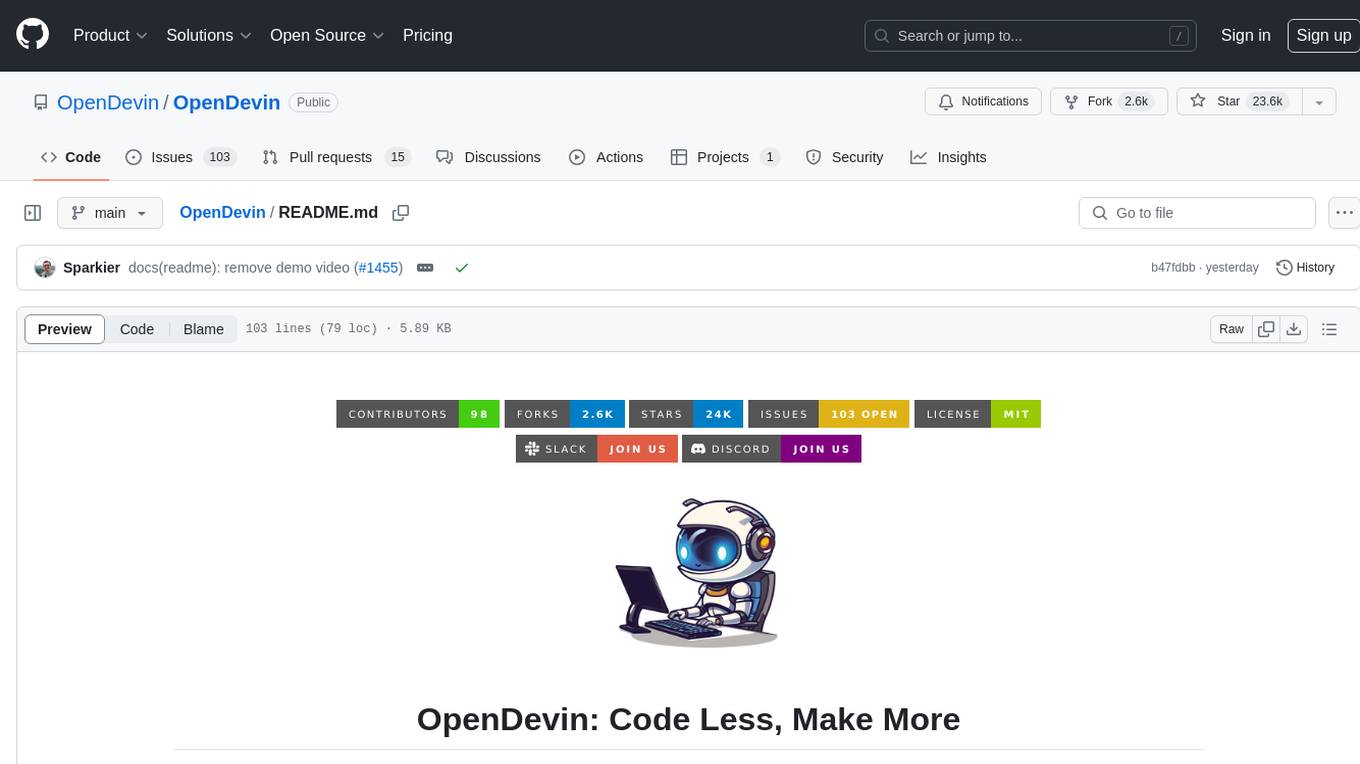
OpenDevin
OpenDevin is an open-source project aiming to replicate Devin, an autonomous AI software engineer capable of executing complex engineering tasks and collaborating actively with users on software development projects. The project aspires to enhance and innovate upon Devin through the power of the open-source community. Users can contribute to the project by developing core functionalities, frontend interface, or sandboxing solutions, participating in research and evaluation of LLMs in software engineering, and providing feedback and testing on the OpenDevin toolset.
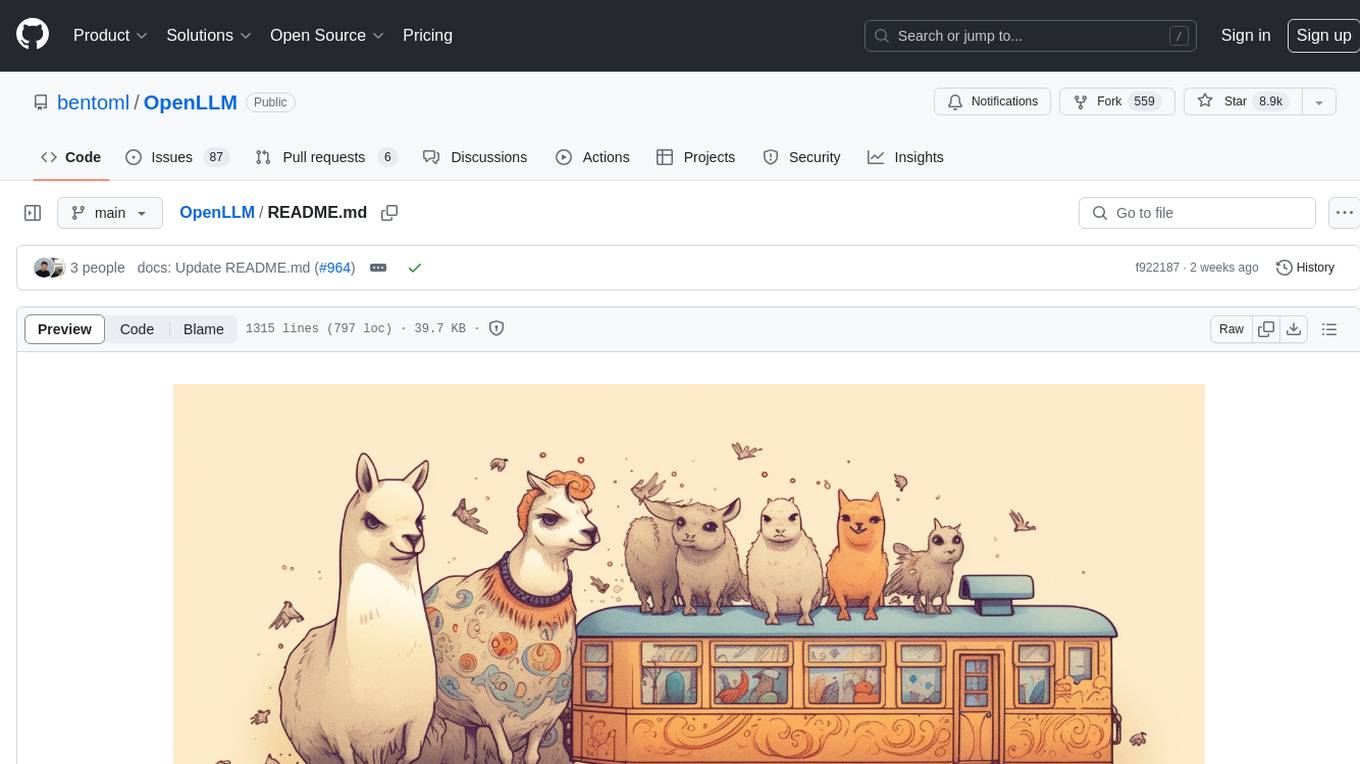
OpenLLM
OpenLLM is a platform that helps developers run any open-source Large Language Models (LLMs) as OpenAI-compatible API endpoints, locally and in the cloud. It supports a wide range of LLMs, provides state-of-the-art serving and inference performance, and simplifies cloud deployment via BentoML. Users can fine-tune, serve, deploy, and monitor any LLMs with ease using OpenLLM. The platform also supports various quantization techniques, serving fine-tuning layers, and multiple runtime implementations. OpenLLM seamlessly integrates with other tools like OpenAI Compatible Endpoints, LlamaIndex, LangChain, and Transformers Agents. It offers deployment options through Docker containers, BentoCloud, and provides a community for collaboration and contributions.
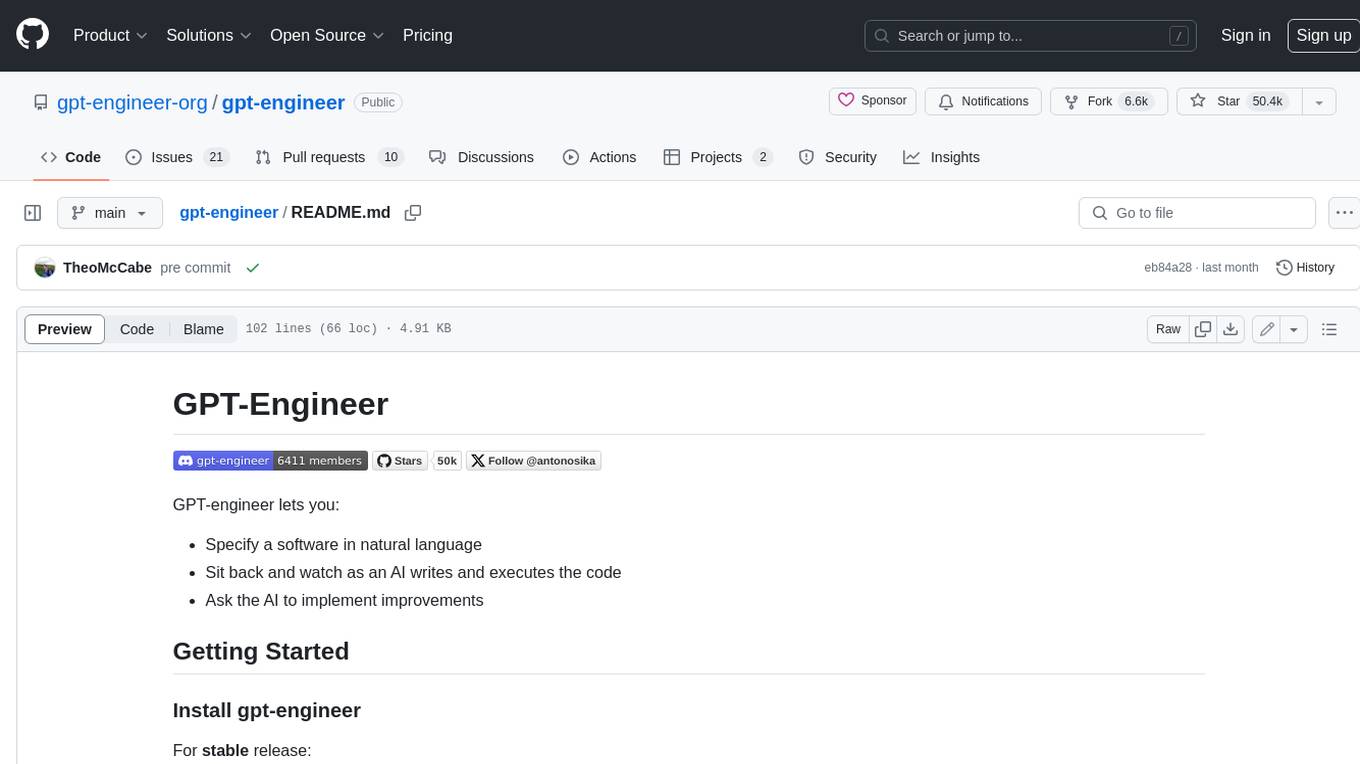
gpt-engineer
GPT-Engineer is a tool that allows you to specify a software in natural language, sit back and watch as an AI writes and executes the code, and ask the AI to implement improvements.
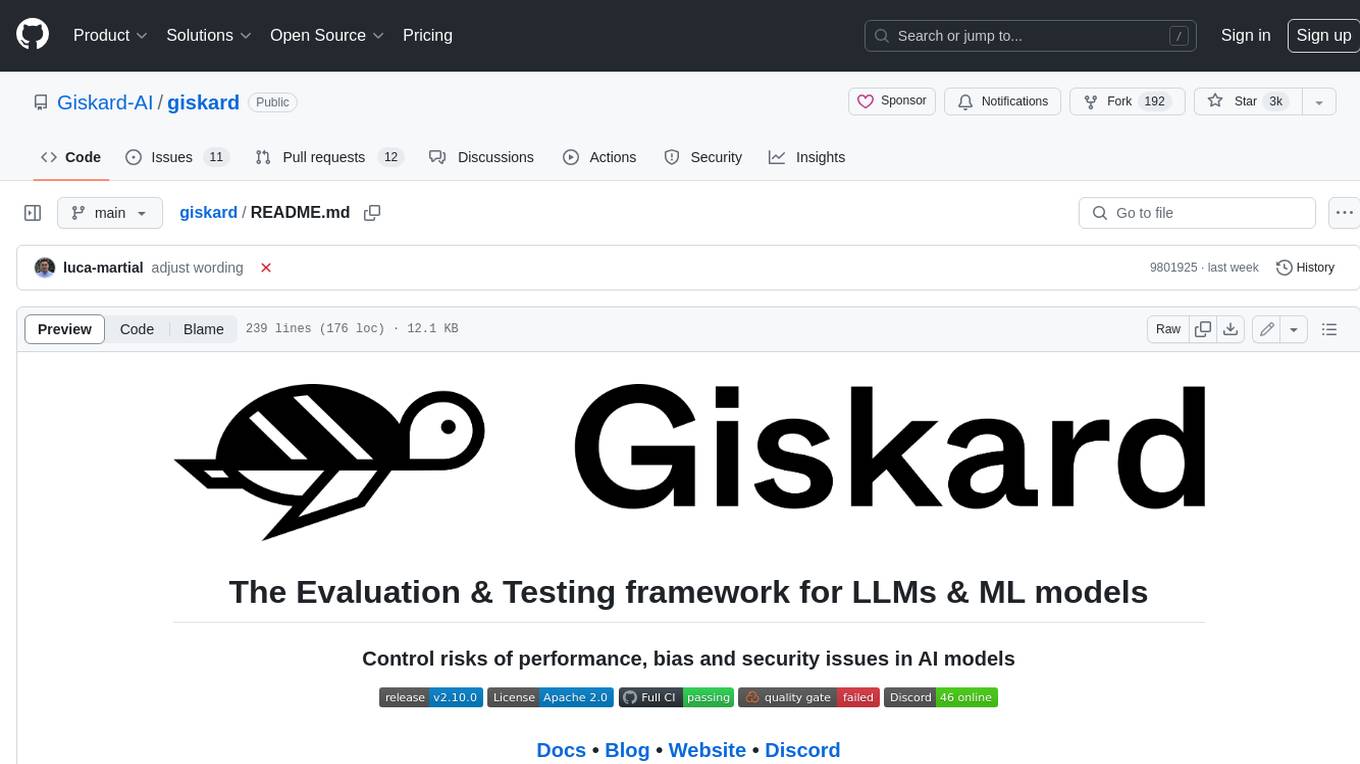
giskard
Giskard is an open-source Python library that automatically detects performance, bias & security issues in AI applications. The library covers LLM-based applications such as RAG agents, all the way to traditional ML models for tabular data.
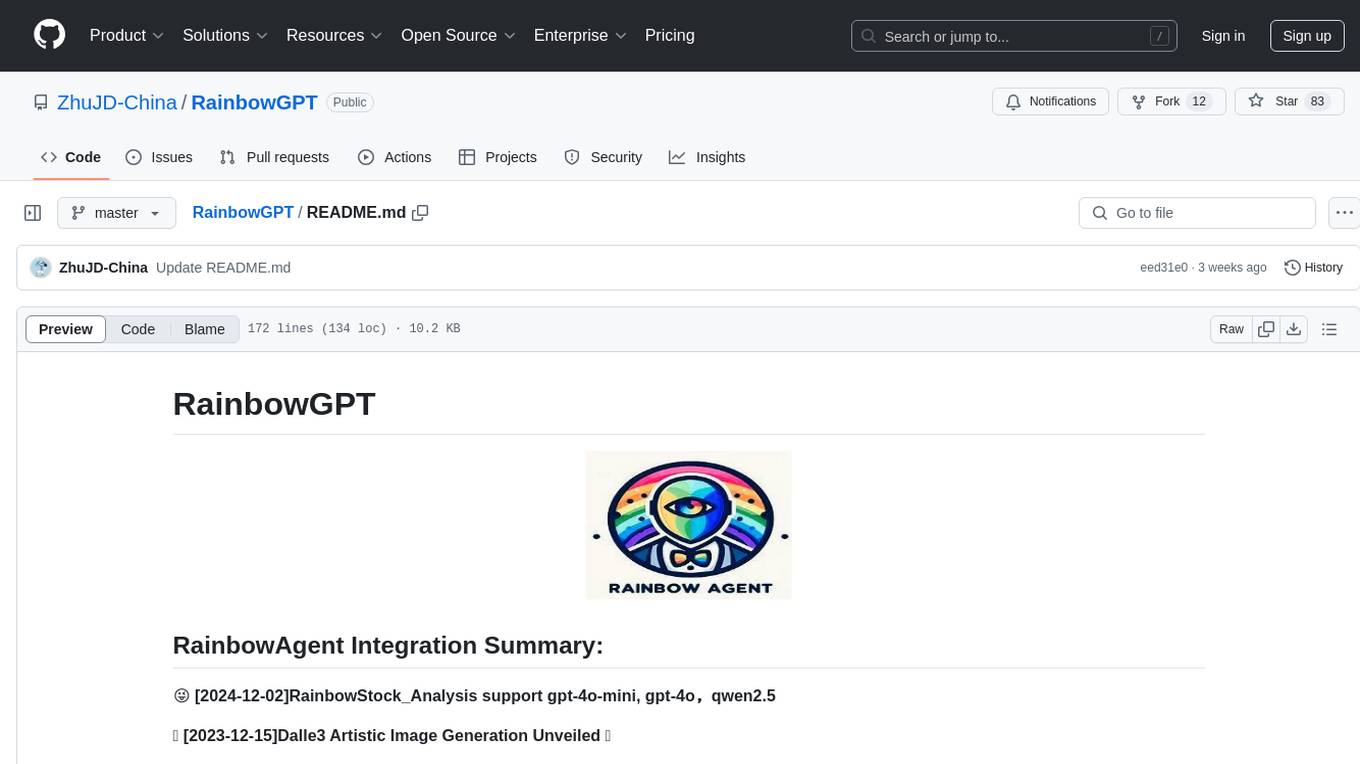
RainbowGPT
RainbowGPT is a versatile tool that offers a range of functionalities, including Stock Analysis for financial decision-making, MySQL Management for database navigation, and integration of AI technologies like GPT-4 and ChatGlm3. It provides a user-friendly interface suitable for all skill levels, ensuring seamless information flow and continuous expansion of emerging technologies. The tool enhances adaptability, creativity, and insight, making it a valuable asset for various projects and tasks.
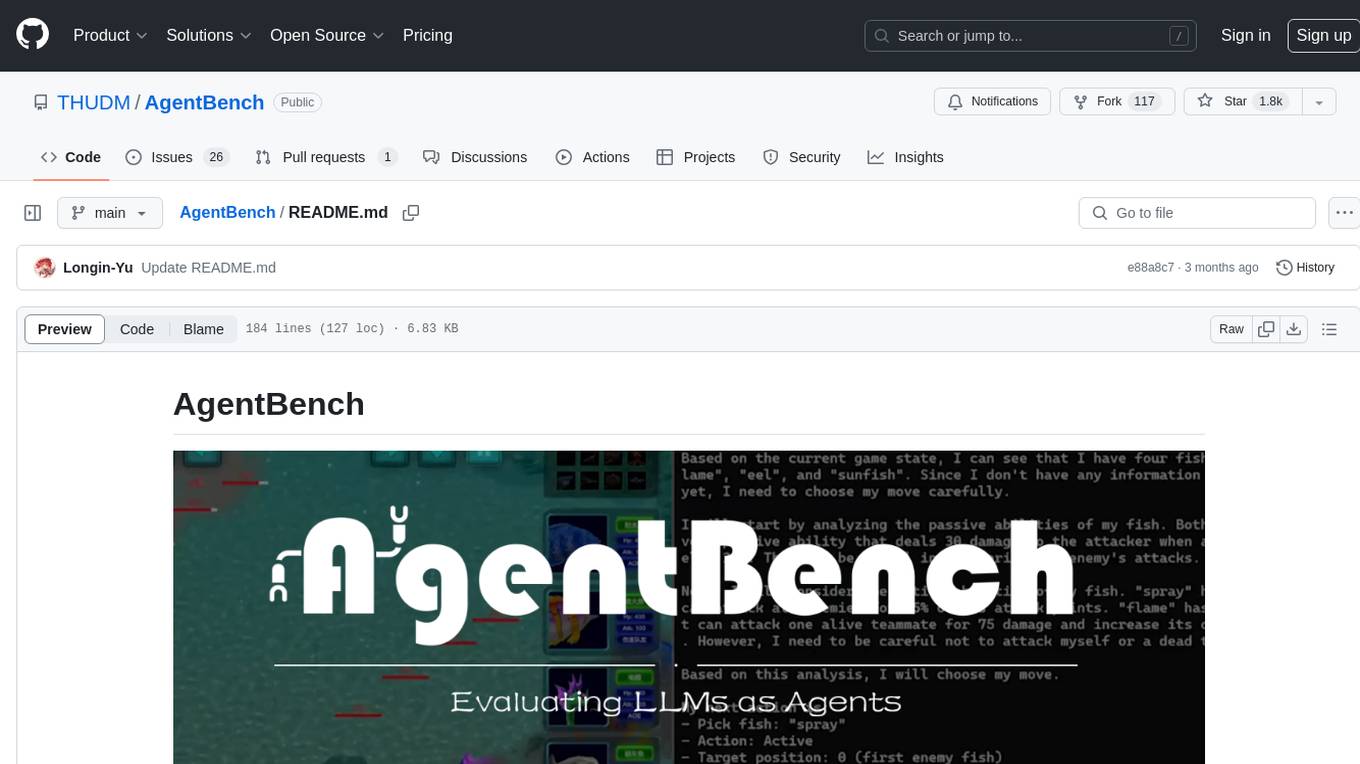
AgentBench
AgentBench is a benchmark designed to evaluate Large Language Models (LLMs) as autonomous agents in various environments. It includes 8 distinct environments such as Operating System, Database, Knowledge Graph, Digital Card Game, and Lateral Thinking Puzzles. The tool provides a comprehensive evaluation of LLMs' ability to operate as agents by offering Dev and Test sets for each environment. Users can quickly start using the tool by following the provided steps, configuring the agent, starting task servers, and assigning tasks. AgentBench aims to bridge the gap between LLMs' proficiency as agents and their practical usability.
For similar tasks

contracts
AXONE Smart Contracts repository hosts Smart Contracts for the AXONE network, compatible with any Cosmos blockchains using the CosmWasm framework. It includes storage, sovereignty, and resource management oriented Smart Contracts. Each contract has different functionalities and maturity stages, with detailed tech documentation and emojis indicating maturity levels. The repository provides tools for building, testing, deploying, and interacting with Smart Contracts, along with guidelines for contributing and community engagement.
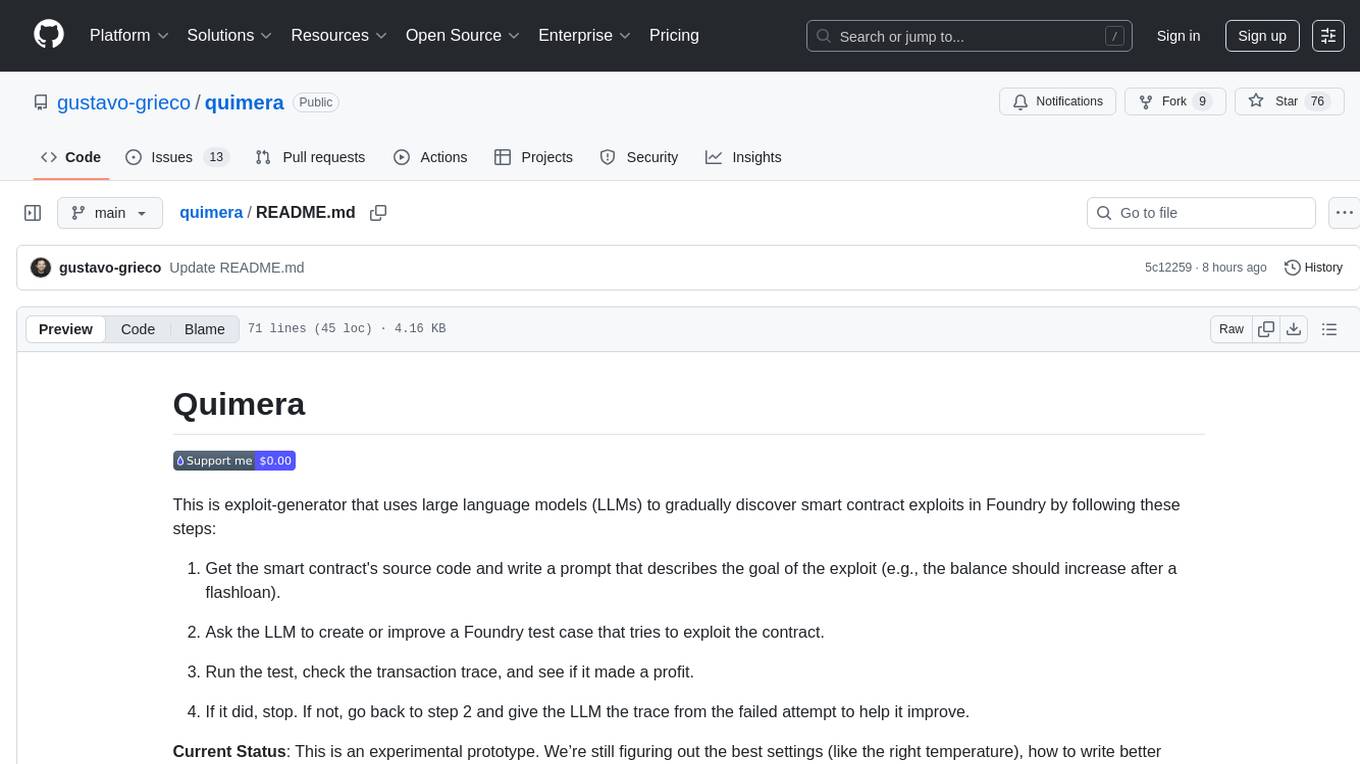
quimera
Quimera is an exploit-generator tool that utilizes large language models (LLMs) to uncover smart contract exploits in Foundry. It follows steps such as obtaining the smart contract's source code, creating a prompt for the exploit goal, generating or enhancing a Foundry test case, running the test, and analyzing the transaction trace for profitability. The tool is currently in an experimental prototype stage, focusing on optimizing settings, prompt creation, and exploring its capabilities. It has successfully rediscovered known exploits like APEMAGA, VISOR, FIRE, XAI, and Thunder-Loan using Gemini Pro 2.5 06-05.
For similar jobs

contracts
AXONE Smart Contracts repository hosts Smart Contracts for the AXONE network, compatible with any Cosmos blockchains using the CosmWasm framework. It includes storage, sovereignty, and resource management oriented Smart Contracts. Each contract has different functionalities and maturity stages, with detailed tech documentation and emojis indicating maturity levels. The repository provides tools for building, testing, deploying, and interacting with Smart Contracts, along with guidelines for contributing and community engagement.
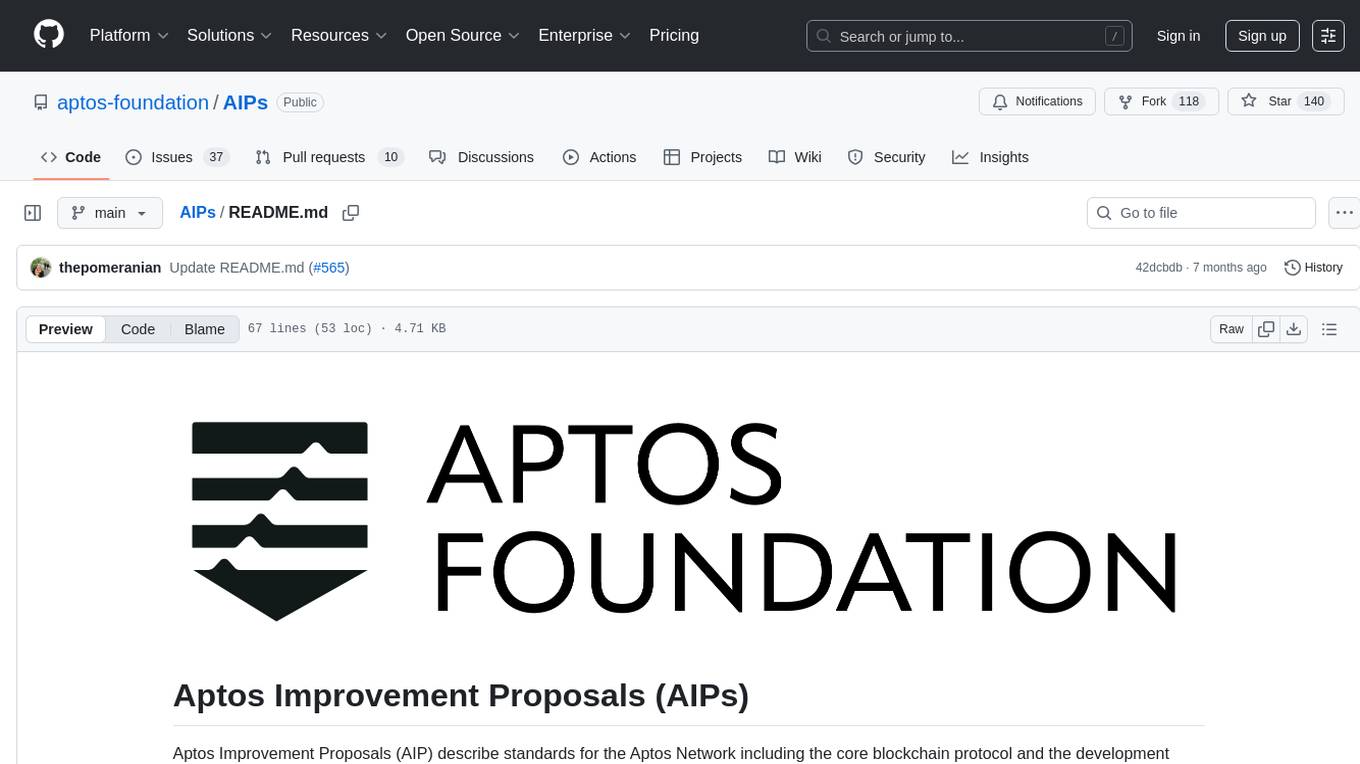
AIPs
Aptos Improvement Proposals (AIP) describe standards for the Aptos Network including the core blockchain protocol and the development platform (Move), smart contracts and systems for smart contract verification, standards for the deployment and operation of the Aptos Network, APIs for accessing the Aptos Network and processing information from the Aptos Network. AIPs are intended to cover changes that impact active services within the Aptos ecosystem. The AIP issue tracker can be used to store exploratory proposals. To submit an AIP, users need to fork the repository, copy the template file, edit the AIP file, commit changes, and submit a pull request. AIPs are categorized as Standard and Informational, with different statuses like Draft, In Review, Ready for Approval, Accepted, Rejected, and On Hold. Users can provide feedback on AIPs by following discussions, evaluating communication clarity, and understanding the impact on the community.
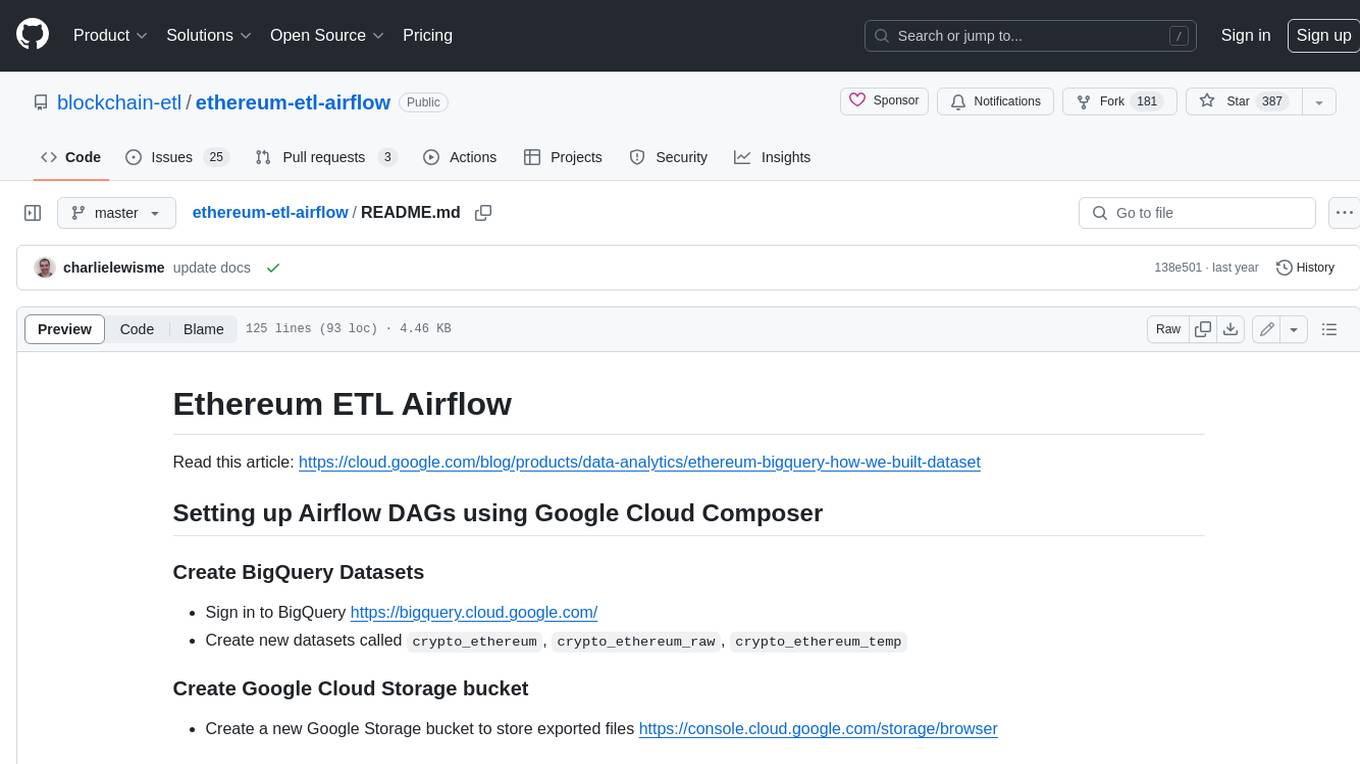
ethereum-etl-airflow
This repository contains Airflow DAGs for extracting, transforming, and loading (ETL) data from the Ethereum blockchain into BigQuery. The DAGs use the Google Cloud Platform (GCP) services, including BigQuery, Cloud Storage, and Cloud Composer, to automate the ETL process. The repository also includes scripts for setting up the GCP environment and running the DAGs locally.
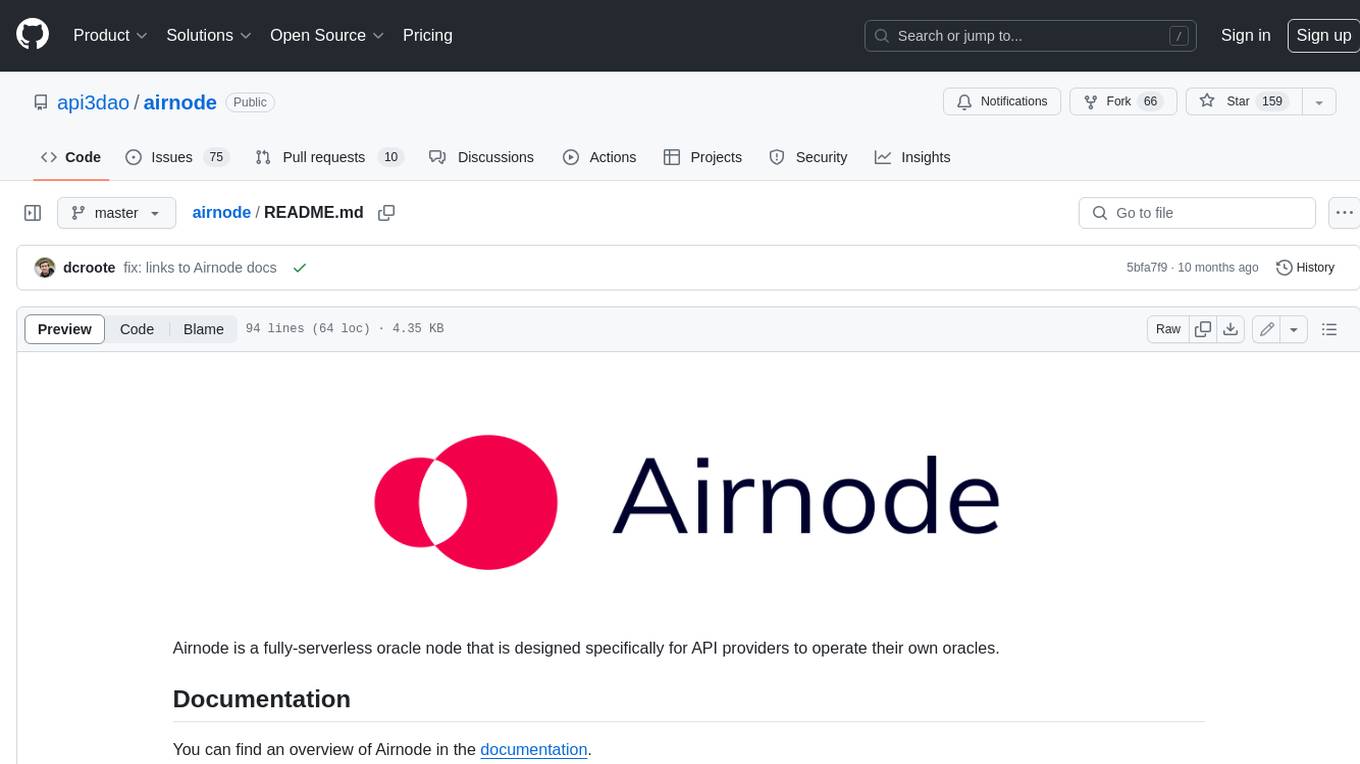
airnode
Airnode is a fully-serverless oracle node that is designed specifically for API providers to operate their own oracles.
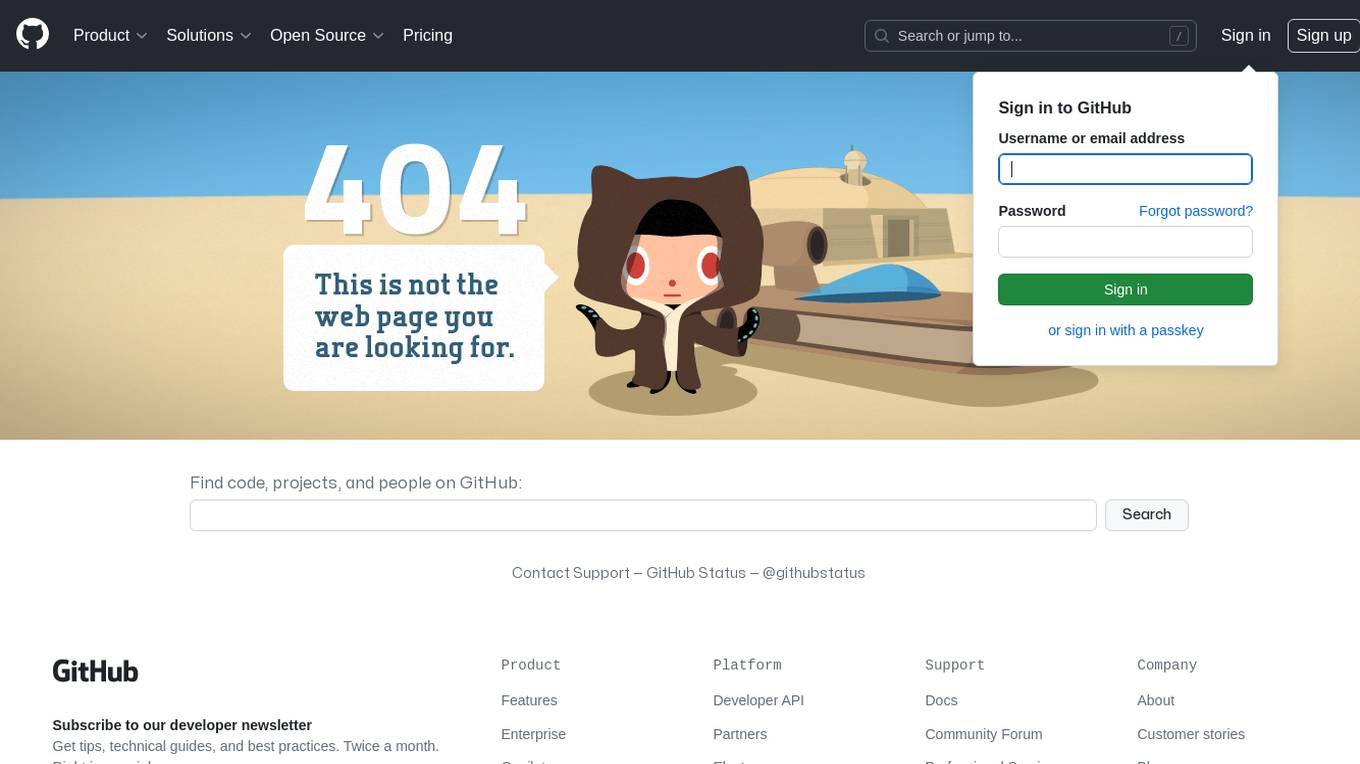
CHATPGT-MEV-BOT
The 𝓜𝓔𝓥-𝓑𝓞𝓣 is a revolutionary tool that empowers users to maximize their ETH earnings through advanced slippage techniques within the Ethereum ecosystem. Its user-centric design, optimized earning mechanism, and comprehensive security measures make it an indispensable tool for traders seeking to enhance their crypto trading strategies. With its current free access, there's no better time to explore the 𝓜𝓔𝓥-𝓑𝓞𝓣's capabilities and witness the transformative impact it can have on your crypto trading journey.
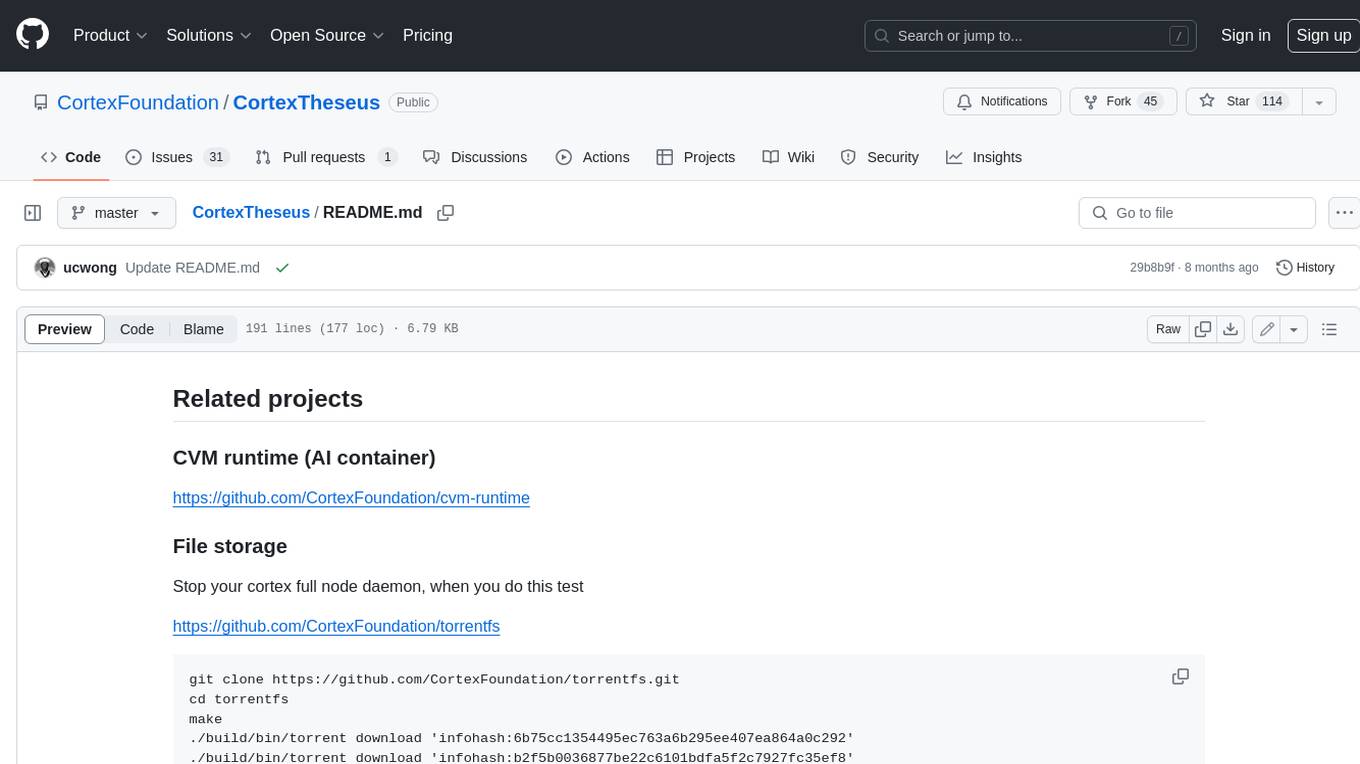
CortexTheseus
CortexTheseus is a full node implementation of the Cortex blockchain, written in C++. It provides a complete set of features for interacting with the Cortex network, including the ability to create and manage accounts, send and receive transactions, and participate in consensus. CortexTheseus is designed to be scalable, secure, and easy to use, making it an ideal choice for developers building applications on the Cortex blockchain.
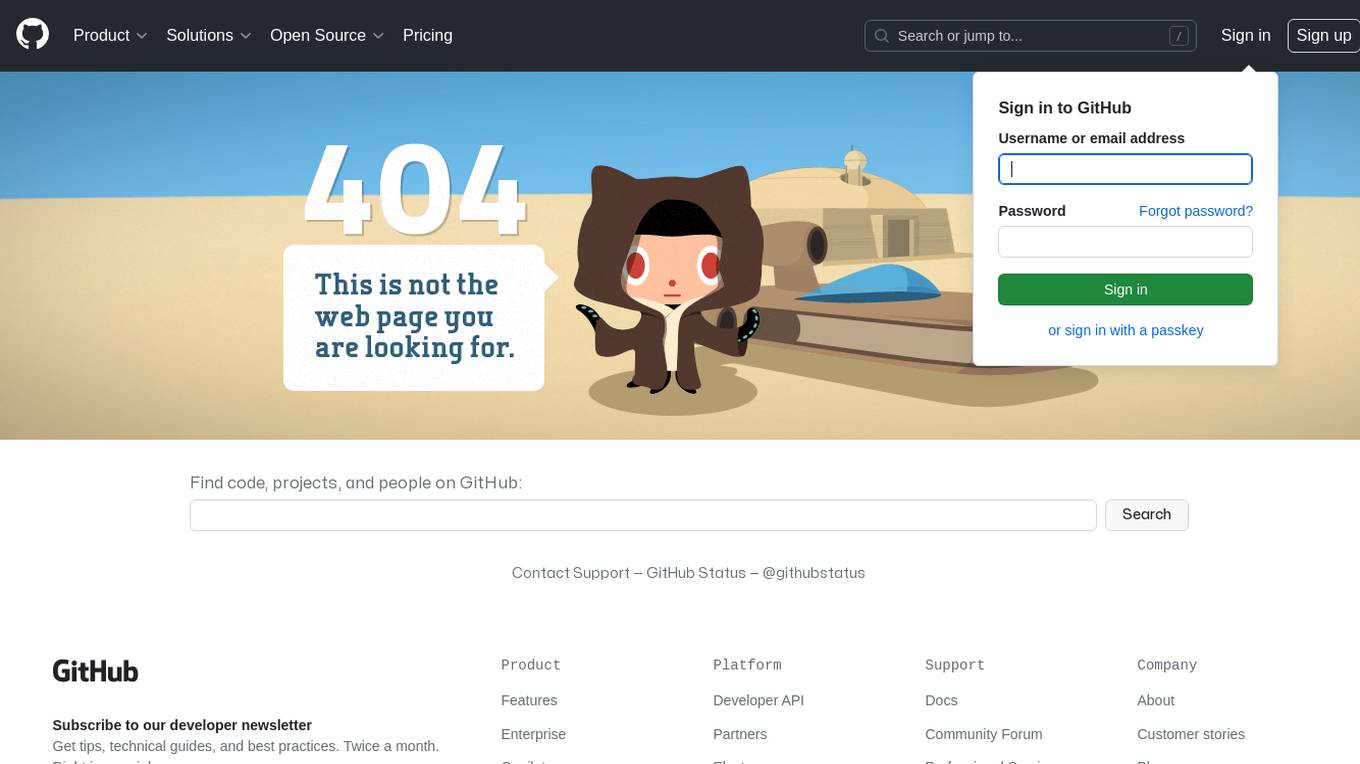
CHATPGT-MEV-BOT-ETH
This tool is a bot that monitors the performance of MEV transactions on the Ethereum blockchain. It provides real-time data on MEV profitability, transaction volume, and network congestion. The bot can be used to identify profitable MEV opportunities and to track the performance of MEV strategies.
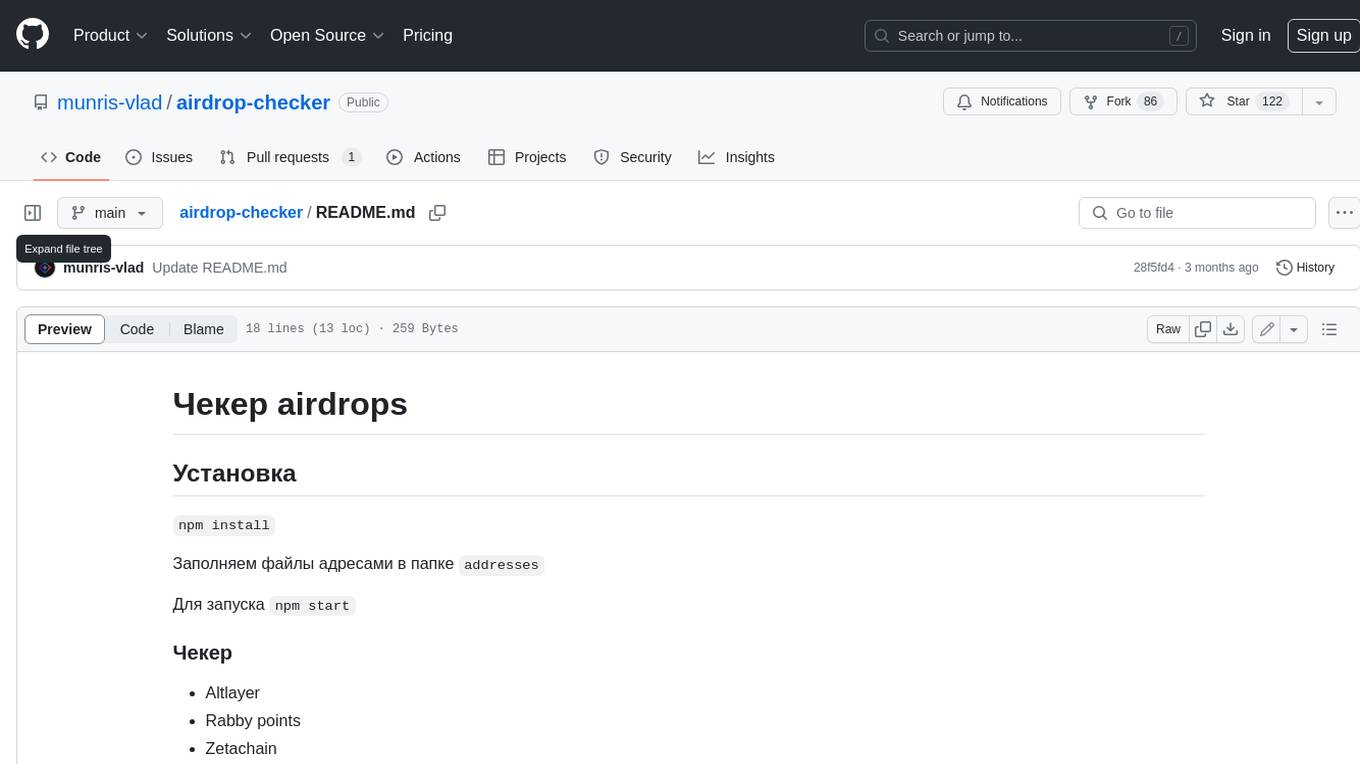
airdrop-checker
Airdrop-checker is a tool that helps you to check if you are eligible for any airdrops. It supports multiple airdrops, including Altlayer, Rabby points, Zetachain, Frame, Anoma, Dymension, and MEME. To use the tool, you need to install it using npm and then fill the addresses files in the addresses folder with your wallet addresses. Once you have done this, you can run the tool using npm start.







